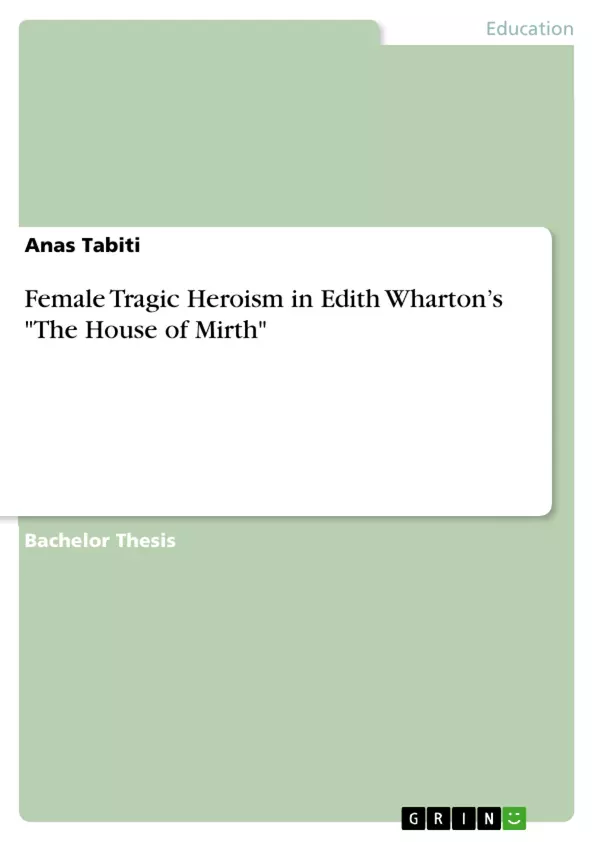This research paper will discuss the topic of female tragic heroism in The House of Mirth. In chapter one of this research paper, I will deal with the main characteristics of tragic hero as explained by Aristotle in his book Poetics that makes Lily Bart as a female tragic hero. The three main characteristics: firstly, her hamartia or tragic flaws which make her downfall at the
end of the novel. Secondly, Lily Bart’s recognition that she is unable to achieve her dreams.Thirdly, Lily Bart’s reversals in her life. In addition, chapter two will discuss Lily Bart’s inherited tragic fate and the use of Edith Charles Darwin’s theory in building the fate of her character Miss Lily. It also will highlight the term of coincidence in Lily Bart’s meetings with men because this coincidence also leads Miss Lily Bart to her downfall. Finally, the last chapter of this research paper will be about Miss Lily
Bart’s unfulfilled dreams. All of these chapters show how Miss Lily Bart is a truly female tragic hero.
Table of Contents
- Chapter one: Lily Bart's main characteristics that makes her a female tragic hero.
- Miss Lily's hamartias…
- Miss Lily Bart and lying..
- Debts and gambling....
- Loving money and wealth:
- Recognition:......
- Reversal of the situation:
- Chapter two: Tragic fate and coincidence..
- Chapter three: Unfulfilled dreams
Objectives and Key Themes
This monograph examines the character of Miss Lily Bart in Edith Wharton's The House of Mirth, analyzing her as a female tragic hero according to the principles of Aristotelian tragedy. The work explores the role of tragic fate and coincidence in shaping Lily's life and ultimately preventing her from achieving her aspirations.
- Tragic Heroism in a Female Character
- The Impact of Society and Class on Individual Choices
- The Role of Money and Wealth in Shaping Destiny
- The Pursuit of Unfulfilled Dreams
- The Interplay of Fate and Free Will
Chapter Summaries
Chapter one delves into Lily Bart's character, examining her personality traits and actions that align with the characteristics of a tragic hero. The chapter analyzes her hamartias, including her tendency towards lying, her entanglement in debt and gambling, and her desire for wealth. It also explores her recognition of her flaws and the reversal of her fortunes as a consequence of her actions.
Chapter two investigates the role of tragic fate and coincidence in shaping Lily's life. The chapter examines how external forces, such as her family's financial struggles and her aunt's influence, contribute to her downfall. It explores the impact of these factors on her choices and the eventual outcome of her pursuit of happiness.
Chapter three focuses on Lily's unfulfilled dreams. The chapter analyzes the aspirations that drive her actions, particularly her desire to marry a wealthy man to escape poverty and secure her social standing. It examines the obstacles she faces in realizing these dreams and the ultimately tragic consequences of her efforts.
Keywords
This monograph examines themes of tragic heroism, social class, wealth, and the pursuit of unfulfilled dreams in the context of Edith Wharton's The House of Mirth. Key concepts include Aristotelian tragedy, hamartia, tragic fate, coincidence, and the social and economic realities of the Gilded Age in New York City.
- Citar trabajo
- Anas Tabiti (Autor), 2019, Female Tragic Heroism in Edith Wharton’s "The House of Mirth", Múnich, GRIN Verlag, https://www.grin.com/document/942279



